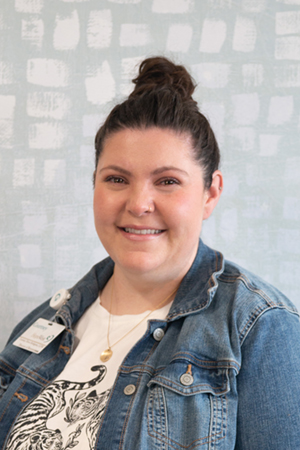As National Grief Awareness Day approaches on August 30th, it’s time to peel back the layers of a topic that often remains covered in silence: grief. As the Director of Bereavement services for children and adults at HopeWest, I’ve walked alongside countless individuals and families navigating the unpredictable landscape of loss. It’s a journey that has taught me one undeniable truth – the shame surrounding grief needs to be broken down, one conversation at a time.
Why is it that grief, a universal human experience, often lurks in the shadows? Why does society sometimes shy away from acknowledging the profound impact of losing a loved one? The answers lie in the misunderstandings and stigmas that have woven themselves into the fabric of our culture.
We live in a world that tends to glorify the idea of “moving on” quickly after a loss. Society often demands that grief should have an expiration date, neatly packaged within a few months. But the truth is, grief doesn’t follow a linear timeline. It’s messy, unpredictable, and personal. Just as every individual is different, so is their grief journey.
It is an all-too-common idea that displaying grief is a sign of weakness, but that’s an attitude that can and should be addressed. I believe grief is not a sign of frailty; it’s a testament to the depth of our emotions and the strength of our connections. Suppressing grief can have profound psychological and emotional consequences, often leading to a cycle of unresolved pain and negative effects on one’s livelihood. Embracing grief is not a sign of vulnerability; it’s a courageous step in wellness.
It’s important to recognize the urge to compare grief. Sometimes we give less credit to a person’s experience if they haven’t lost a close family member, even if we don’t mean to. Grief can be triggered by a variety of losses – the end of a relationship, a pet’s passing, a job transition, or even the loss of one’s health. No matter the source, grief deserves acknowledgment and support.
It may seem that discussing grief will only prolong the pain, but openly addressing grief is not about dwelling in sorrow; it’s about granting permission to find healthy adjustment in a new reality. Grief thrives in the shadows, but it loses its power when exposed to the light of empathy and understanding. Ignoring grief doesn’t make it disappear; it simply buries it deeper, where it can fester and manifest in unhealthy ways.
At HopeWest, we’re on a mission to break down the barriers that hinder open conversations about grief. We believe that acknowledging grief is not a sign of defeat, but a path towards resilience. Our grief support programs provide a space for individuals of all ages to express and process their feelings, share their stories, and find solace in the company of others who understand their journey.
Grief is a testament to the love we’ve shared, the connections we’ve forged, and the lives we’ve cherished. It’s a natural response to loss, and it deserves the same compassion and recognition as any other emotion.
As we approach National Grief Awareness Day, let’s challenge ourselves to not shy away from conversations about loss. Let’s be allies to those who are grieving by offering a listening ear, a comforting shoulder, and a willingness to engage in conversations that matter.
HopeWest offers grief support for adults, children, and teens in our communities.

By Courtney Flores Rodriguez, LCSW, Director of Bereavement at HopeWest











